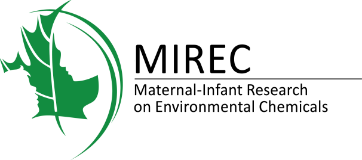
Relationships of First-Trimester Body Mass Index and Weight Change with Persistent Organic Pollutant Concentrations in Pregnant Canadian Individuals.
Levesque M, Ouedraogo M, Fakhraei R, Dingwall Harvey A, Bratton E, Walker M, Dodds L, Gaudet L. Challenges 2023, 14, 13. https://doi.org/10.3390/challe14010013.
Question: Does higher exposure to toxic organic pollutants affect weight during pregnancy?
What did the researchers do:
Levels of several persistent organic pollutants (POPs) were measured in women’s blood samples that were collected at the 1st trimester study visit. Each result was divided by the total lipids measured in the blood sample, as these chemicals are attracted to lipids. The woman’s weight and height were measured at that 1st trimester study visit. Body mass index (BMI) was calculated for each woman as a measure of body fat (BMI = kg/m2, where kg is a person’s weight in kilograms and m2 is their height in meters squared).
What did they find:
Overall, MIREC participants had low blood levels of these chemicals. First-trimester levels of multiple POPs differed significantly across BMI categories, with the highest concentrations in underweight/normal-weight individuals and the lowest in obese individuals.
What does this mean:
These results provide preliminary evidence that first-trimester maternal BMI may be negatively associated with first-trimester concentrations of POPs in blood, possibly suggesting that individuals with obesity may have higher POP concentrations stored within their body fat.
MIREC Année all rights reserved - Privacy policy
Website by Riposte


